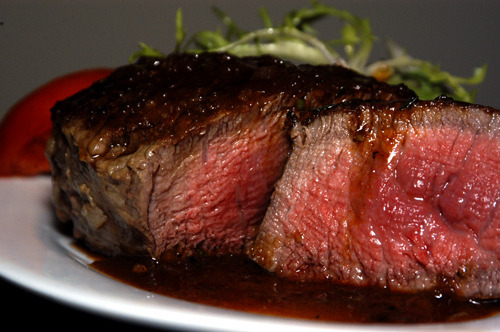Dropping the Meat
P { margin-bottom: 0.08in
A friend took me to dinner last week at a French restaurant. I'd never heard of the place, and it took us a minute to find it after we got lost in a maze of mini-mansions. Our waitress was maybe 30, and we also had a water-pourer who looked about 12 but could pour backwards out of his carafe with astonishing accuracy. There were some buspersons, too, and mid-meal an older woman came along to make sure we were happy. And we were: the food was delicious.
When the bill came, I asked if my friend had been a waitress. Had she ever, at Woolworth counters all over California. This is my question to gauge tip-size, when someone else is paying for my dinner. If you've waited tables, you know how much those tips matter. You're on your feet for hours, remembering orders, carrying heavy trays, remaining civil when people behave poorly. There's a certain customer who feels free to treat you like garbage just because you're waiting on them. Even half a century later, you probably leave good-sized tips yourself. 
I once worked at Ferdinand's, in Cambridge, Mass. — the kind of place you took your parents after college graduation. We had to do this thing I've never heard of since, maybe because the chef was truly French. We had to figure out, after taking an order, how long every cut of meat would take to cook — and then calculate backwards so we could walk into the kitchen and tell them when to begin cooking it in order for everything to be done at the same time. This was called “dropping the meat.” So if you had a table of 6, with 4 meat orders, you had to zip into the kitchen four separate times and have them start the pork chops, which took 8 minutes (I'm making these times up), then the well-done filet, which was 6, then the veal picata, which was 5, then the rare filet, which was 4 and a half.
I have no idea how we did it: seven or eight waiters in line in the kitchen and the cooks ignoring us, but you had to have eye contact to know they'd heard you, and meanwhile your meal is getting screwed up because the line is so long. It was a nightmare.
The ONLY thing that made this tolerable was the size of the tips. Waitpeople are legally paid far less than minimum wage because the government counts tips as part of their earnings. So when you don't get tipped well, it's hard to make a decent living. And if anything goes wrong in the kitchen — your eggs are poached hard instead of soft — there's no way a customer can take revenge except by reducing the tip, even though it wasn't your fault.
Waiters tip bussers out of their own tips, and sometimes a percentage to the kitchen staff, too. So even if you never once waited on a table, be generous: put down 20%. The food will taste better. And your harried waitressing brothers and sisters all over the world will thank you.



